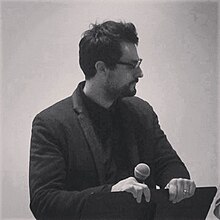Gabriele Tinti (poet)
Appearance

Gabriele Tinti (born 18 December 1979) is an Italian poet.
Quotes
[edit]- Rome is the wide-open mouth of eternal words, the hard stone where everything has remained — ruins, fragments —where nothing is lost.
- "Willem Dafoe’s poetry readings breathe new life into Rome’s ancient sites" The Times, April 05, 2024
- I have always taken the side of the scapegoat (…) I believe that #MeToo is becoming a violent witch hunt. Spacey, like others, has the right to the presumption of innocence and I cannot in any way support the preventative exclusion and annihilation of a man, woman or work,”
- "Domingo to return to the stage" The Washington Post, August 23, 2019
- Boxing is a space in which our repressed feelings, our fears and our identity anxieties all converge. Boxing resolves everything in the sense of death. It manages to do so because it is a primal display; a manifestation of an unrepeatable existential experience, a ‘true’ reality; the revelation of an internal world in which not only the body (with all its suffering) and the flesh are on the line, but also the intellect, the spirit and so-called ‘culture.’ It is a cruel spectacle made of pain and love, of the unpredictable and the serious, of boredom and great emotions.
- "Poetry, Translation, and “Spectacles of suffering”: an interview with Gabriele Tinti" Vol. 1 Brooklyn, March 31, 2014
- Before writing “Boxer” I could do nothing but sing of his fragility and solitude; of the weight of his dramatic life and the tragic sense of death, of banality, that belongs even to ancient masterpieces we would wish to be eternal. The uncertainty that has often surrounded their attribution, the mutilated and fragmentary condition in which they have almost always come down to us from antiquity, gave me the cue to speak of the transience of life, of every one of man’s works, of the meaning of time.
- "Poem for the Boxer at rest" J. Paul Getty Museum, September 8, 2015
- Orpheus, the divining poet of stone, has always made me feel a profound nostalgia for a mythical ancient age of art and poetry. Nostalgia for an age when poets could really sing; an age when youths, bards—destined to decline into rhapsodes and finally into the scribblers we writers have become—used the living word with a divine voice. After this age there was no more psalmonising, no more presentiment, no more divination. No song, no poem, no art of today can truly shine once it has been compared to this first, great season of poetry.
- "Songs of stone" J. Paul Getty Museum, March 21, 2017
- The intense melancholy of Herakles by Skopas, the sunken eyes beneath the arched eyebrows, those pathetic eyes turned toward the sky, led me to imagine Hercules in the crucial moment when he found himself faced with death. It is in that moment that he takes onto his shoulders all the suffering of the world, freeing it.
- "Giving life to Hercules: Q&A with Gabriele Tinti and Joe Mantegna" LACMA, March 21, 2016

